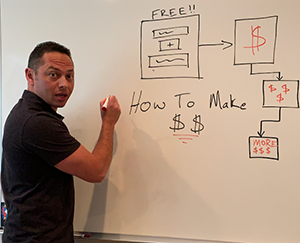Weekend Favs December 28th written by Jordan E read more at Duct Tape Marketing
My weekend blog post routine includes posting links to a handful of tools or great content I ran across during the week. I don’t go into depth about the finds, but I encourage you to check them out if they sound interesting. The photo in the post is a favorite for the week from an online […]
Why Two Weeks Notice Is Hurting Workplace Culture written by John Jantsch read more at Duct Tape Marketing
The Duct Tape Marketing Podcast with Robert Glazer
In this episode of the Duct Tape Marketing Podcast, I interviewed Robert Glazer, founder of Acceleration Partners, a global partner marketing agency, and author of the bestselling book Rethinking Two Weeks Notice. Robert is an expert in workplace culture, employee retention, and leadership. His work challenges outdated corporate practices and offers fresh strategies for creating thriving workplace environments.
During our conversation, Robert shared powerful insights on why the traditional “two weeks’ notice” practice is no longer effective and how companies can replace it with the Open Transition Program. By fostering psychological safety, improving communication, and rethinking job exit strategies, businesses can enhance employee retention, protect workplace culture, and build long-term loyalty.
Robert Glazer’s fresh perspective on employee transitions offers actionable strategies for improving employee retention, workplace culture, and corporate reputation. By replacing outdated practices like the two weeks’ notice with the Open Transition Program, businesses can create a supportive, loyal, and high-performing work environment.
Key Takeaways:
- Why Two Weeks’ Notice Is Outdated
The traditional two weeks’ notice creates rushed transitions, strains relationships, and disrupts workplace culture. This outdated rule often leaves both employers and employees feeling dissatisfied and unsupported during career transitions. - The Open Transition Program: A Better Solution
Robert introduced the Open Transition Program, a proactive approach that encourages open conversations about career transitions. By providing a structured and supportive process, employees can leave on better terms, ensuring smoother transitions for all parties. - Psychological Safety Is the Foundation of Loyalty
Building psychological safety within the workplace allows employees to share their career aspirations and challenges without fear. This creates an environment of trust, where transitions can be managed with transparency and respect. - Strengthening Workplace Culture Through Better Transitions
Employee transitions are a crucial but often overlooked aspect of workplace culture. A thoughtful approach to resignations and career changes demonstrates respect for employees and reinforces a culture of trust and collaboration. - The Long-Term Benefits of Positive Transitions
Companies that implement better job exit strategies often see long-term benefits, including alumni referrals, Boomerang employees, and stronger client relationships. Treating employees well at the end of their tenure creates lifelong advocates for the brand. - Replacing Resentment with Respect
Traditional resignation practices can leave both employees and employers feeling resentful. The Open Transition Program focuses on respect, ensuring that employees leave on a positive note while protecting the company’s reputation. - The Cost of Ignoring Exit Strategies
Ignoring the importance of employee transitions can lead to high turnover, damaged client relationships, and a negative reputation. Implementing modern job exit strategies can mitigate these risks and foster long-term success.
Chapters:
- [00:00] Opening
- [00:34] Introduction to Robert Glazer
- [01:20] Problems with the Traditional Two Weeks Notice
- [03:45] Replacing Two Weeks Notice with the Open Transition Program
- [05:30] Addressing Employee Performance Issues Early and Constructively
- [10:04] Organizational Culture and Open Transition Programs
- [17:24] Structured Employee Transitions and Client Retention
More About Robert Glazer:
- Check out Robert Glazer’s Website
- Connect with Robert Glazer on LinkedIn
- Read Rethinking Two Weeks’ Notice: Changing the Way Employees Leave Companies for the Better by Robert Glazer
John Jantsch (00:00.705)
Hello and welcome to another episode of the Duck Tape Marketing Podcast. This is John Jantsch. My guest today is Robert Glazer. He’s the founder and chairman of the board of Acceleration Partners, a global partner marketing agency and the recipient of numerous industry and company culture awards, including Glassdoor’s Employees Choice Awards two years in a row. He’s the author of the inspirational newsletter, Friday Forward. Everybody should subscribe and the number one Wall Street.
Robert Glazer (00:08.144)
Thank
John Jantsch (00:30.571)
journal USA Today and international bestselling author of five books. We’re going to talk about his latest today, Rethinking Two Weeks Notice, Changing the Way Employees Leave Companies for the Better. So Robert, welcome back to the show.
Robert Glazer (00:31.322)
Bye.
Robert Glazer (00:44.548)
John, thanks for having me.
John Jantsch (00:46.185)
So, the enemy is two weeks notice the standard practice of, of, Hey, I’m, I got a better offer. I’m giving you my two weeks notice or the other way around. You’re not working out here. You got two weeks notice. So that kind of deal. So, so why is that bad?
Robert Glazer (00:57.54)
Yeah, here’s two weeks severance. Yeah.
Robert Glazer (01:03.824)
There’s two problems that we have. Well, I’m a big fan of psychology and cognitive dissonance. And so the left side of our brains knows that we’re not in lifetime employment situation anymore. We don’t have pensions, people are going to work forever. And yet when people then leave our organization, the right side of the brain, we treat it more like the end of a marriage than the end of a professional sports contract, like this huge betrayal or otherwise. So we’re just not reconciling.
these two things and it produces bad outcomes. You have employees who leave employers and their managers and their mentors with a bad taste in their mouth. what they’re told by their parents, two weeks notice. That’s what you do, it’s respectful. But if you mentored someone for three years, you trusted them, you gave them a lot of rope and they were out a little bit and had doctor’s appointments and now they’re leaving in two weeks.
John Jantsch (01:44.791)
Yeah. Right.
Robert Glazer (01:55.874)
You don’t realize, I mean, I get a lot of back channel references over the years. Everything is layout. You’re going for a job, two jobs from now and someone reaches out and they’re like, yeah, John, like, I just remember how you left, right? And so endings really matter. If you’re planning a conference, your last speaker is really important. It’s sort of, it’s everything that people remember. And then similarly for the company, particularly in a service business, know, clients hate account turnover.
John Jantsch (02:10.486)
Yes.
John Jantsch (02:14.433)
Yeah.
Robert Glazer (02:22.436)
rushing to get a new person, all these things. it just really is suboptimal. It’s just an outdated process. Most people just don’t know what to replace it with.
John Jantsch (02:30.423)
Yeah.
Right. Yeah. It’s funny. I, you know, in marketing circles, I mean, I pay a lot of attention to testimonials and reviews and things like that. And it’s amazing how really the perception that somebody has of the brand is not the brand, but Rusty, you know, the guy that fixed their boiler, you know, or whatever.
Robert Glazer (02:50.832)
Look, anyone listening to this, if you are either personally or professionally, whether it’s accounting firm or your marketing agency, there is nothing that hurts the reputation more of a professional services firm than account turnover. It’s the thing that puts it at risk. If you’ve ever been with a brand and you get three different managers in 12 months, you’re like, I’m out. I don’t want to do this anymore.
John Jantsch (03:03.501)
F
John Jantsch (03:07.777)
Yeah. Yeah. Yeah. Yeah. It was too much work to get in a rhythm. all right. So I’m just going to jump right into your concept of what would replace it. The open transition program OTP. You got to love a framework. So Robert, let’s just go there. We’re going to talk about bits of it, but maybe set the table. What is, what is your, theory about replacing two weeks notice?
Robert Glazer (03:12.89)
Yeah.
Robert Glazer (03:35.408)
Yeah. So, so it’s not just the theory because we practiced it for over 10 years and, and, but it is a theory, but it’s also, and I’ve had a lot of other leaders just with little bits and pieces who wanted to be better reached out. And look, we were building a great culture and just the two week notice thing felt antithetical to that. So we tried this concept of a transition program that said, look, when you’re ready to leave, we’ve created psychological safety, come and have an open, honest conversation with us. We will never walk anyone out the door that day if they come and have it. And likewise,
John Jantsch (03:41.185)
You
Robert Glazer (04:04.336)
our managers are gonna have honest conversations with you. And when we kind of sense that something’s not going right, we’ll see if we can fix it. And most problems, if you actually get to them earlier, they don’t become irrecoverable. If you wait long enough, then everyone’s pissed and they can’t get it. It almost doesn’t even matter what the original problem was. Now you’ve got this whole vicious trust cycle and stuff going on.
John Jantsch (04:21.921)
Yeah. Yeah.
Robert Glazer (04:26.266)
So we said, look, it’s okay, we’ll enter you into a transition program and maybe that’s 90 days, but you’re working here and you’re starting to interview and you’re communicating with your boss about that. And maybe our HR teams helping you with your resume. And we want you to be a productive alumni member. When it’s time to go, we want that to be a good outcome. And we’d rather do that and have less surprises and pay you to work here, understanding we’re gonna get some diminished capacity.
paying you severance or paying you kind of not to work or go away and blowing the thing up at the end.
John Jantsch (05:01.557)
Yeah, there’s a couple things you said there. I want to circle back to that idea that most problems are created by because we just don’t deal with them because we’re like, I, you know, an employee gets fired, but I should have done that three months ago, you know, kind of, kind of thing. And so it just really deteriorates. So, I think that’s, that’s, I think people have to realize that before they can start thinking about the open transition program, right?
Robert Glazer (05:26.768)
Right. is psychological safety is that there’s four components, psychological safety, open communication, mutual respect and commitment to be mutually beneficial outcomes. Psychological safety is the foundation of this. With it, you can have some good outcomes. it’s, we’re recording this in December. John, like if I am firing you this week, cause I am at my wits end where I was going to put you on a pip and you’re with your wits end. What the issue was probably emerged in March and.
John Jantsch (05:31.095)
Yeah.
Robert Glazer (05:55.288)
If I had really, and it emerges some performance problems, but this is the issue. Like this is like Western medicine versus Eastern. If three people have a headache and I give them a Tylenol, it might help the headache, but one is dehydrated, one’s allergic to gluten and one has a brain tumor, right? Tylenol is not a cure for that. So I talk in this book around digging to the root and there’s three common roots. Problems the employee needs to fix, problems the employer can fix and wants to fix, and then problems that.
they’re not gonna fix. So I start noticing you’re a little off in March and instead of saying, John, you gotta do better or whatever, I’m like, John, like what’s going on? And you confide in me, because I’m your manager and you might say one of three totally different things. One, you lost your childcare and so you’re really tired and distracted or you’re going through a separation and so you’re just not there. And so was like, look, John, I can help with this, we can change your hours, but this is on you to fix. And generally, if you repair that problem,
your satisfaction with work and your performance is gonna improve. The second one you say, look, the last three people that we hired were at a higher level me, higher salary, I’m doing the same work, I was promised a raise years ago, like I’m just getting really frustrated, right? And if I look at that and I say, geez, John’s right, like we kind of overlooked him. I might say he’s not and that’s a different discussion, yo
Recommended Story For You :

How To Make $3493 Commissions Without Doing Any Selling

Successful dropshippers have reliable suppliers.

People Think I Use A Professional Voiceover Artist. NO! I Just Use Speechelo!

Make Money Testing Apps On Your Phone Or Tablet

Make More Money or Lose Everything

Sqribble Is The ONLY eBook Creator You’ll Ever Need.

Work & Earn as an Online Assistant

Create Ongoing Income Streams Of $500 To $1000 Or More Per Day



